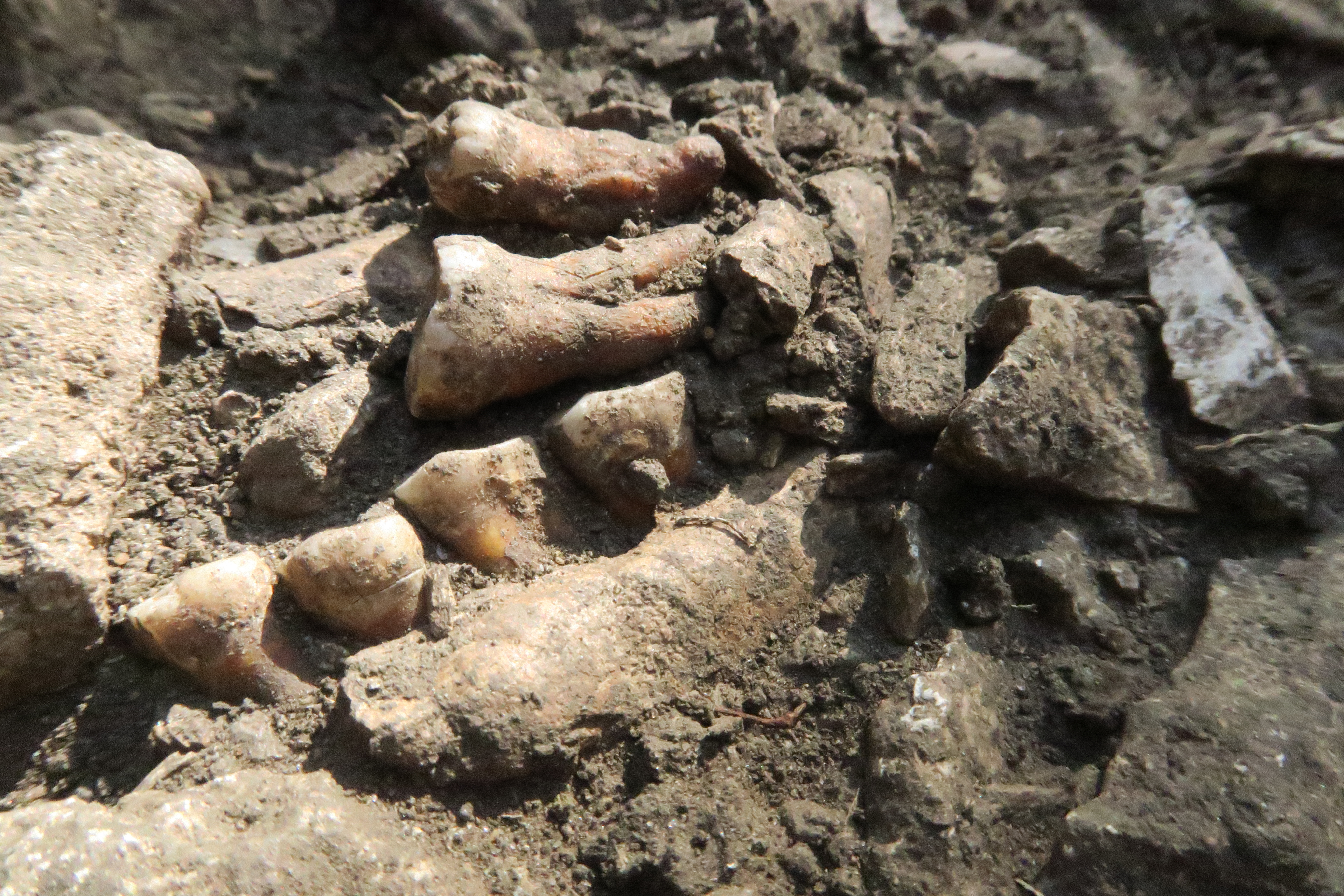Neanderthal
Can't Get Enough Carbs? That Craving Might Have Started More Than 800,000 Years Ago
New research traces the genetic underpinnings of the enzyme amylase, which helps humans digest starches and sugars
Ancient DNA Reveals Neanderthal Group Was Isolated for 50,000 Years
A new study, based on the remains of a Neanderthal nicknamed Thorin, is shaking up what archaeologists long thought about these early humans in Europe
Early Humans Migrated Out of Africa Several Times, DNA Study Suggests
Homo sapiens interbred with Neanderthals as early as 250,000 years ago and may have ultimately bred them out of existence, according to new research
Neanderthal Child May Have Had Down Syndrome, Fossil Suggests
The child's survival until at least 6 years old could be evidence of collaborative caregiving in Neanderthal societies, according to a new paper
50,000-Year-Old Neanderthal Bones Have Remains of Human Viruses, Scientists Find
The preliminary analysis is a first step in testing the theory that infectious diseases played a role in Neanderthals' extinction
This 130,000-Year-Old Decorative Bear Bone May Be the Oldest Known Neanderthal Art
Researchers say the carved artifact was not a utilitarian item and instead served a symbolic purpose
Meet Shanidar Z, a Neanderthal Woman Who Walked the Earth 75,000 Years Ago
After carefully piecing her skull back together, archaeologists and paleoartists have created a lifelike 3D reconstruction of the woman's face
Modern Indian People Have a Wide Range of Neanderthal DNA, Study Finds
Genomes of Indian people today reveal links to a prehistoric migration and a group of Iranian farmers, as well as several new sequences from the Neanderthal genome
Neanderthals Made a Special Glue to Engineer Grips for Stone Tools, Study Suggests
An analysis of forgotten museum artifacts reveals the oldest evidence of a complex adhesive in Europe
Humans and Neanderthals Lived Side by Side in Northern Europe 45,000 Years Ago, Study Finds
Archaeologists identified bone fragments of prehistoric modern humans in Germany, suggesting several millennia of coexistence with Neanderthals before the species disappeared
Thirteen Discoveries Made About Human Evolution in 2023
Smithsonian paleoanthropologists reveal some of the year’s most fascinating findings about human origins
Neanderthal DNA May Help Explain Why Some People Are Early Risers
A new study finds a link between Neanderthal DNA and modern human genes related to the internal body clock, or circadian rhythm
Here's What We Know About Neanderthals So Far
Today, thanks to new artifacts and technologies, findings about our closest relatives are coming thick and fast
Neanderthals May Have Hunted Cave Lions
Researchers say well-preserved bones may be the earliest direct evidence of the hunting of large predators
Our Human Ancestors Very Nearly Went Extinct 900,000 Years Ago, Genetics Suggest
A study proposes that the population that gave rise to modern humans may have been reduced to roughly 1,300 reproducing individuals
These Ancient Japanese Islanders Created a Signature Skull Shape by Molding Babies' Heads
Some 1,800 years ago, the Hirota people practiced intentional cranial modification
Scientists Turn to Human Ancestors' DNA in Search for New Antibiotics
Microbe-fighting molecules that once existed in Neanderthals and Denisovans have been re-created in the lab and tested in mice
Giant Hand Axes Discovered in England Point to Prehistoric Humans' 'Strength and Skill'
A trove of artifacts found in a valley in Kent includes the third largest hand ax found in the country to date
Oldest Known Neanderthal Engravings Were Sealed in a Cave for 57,000 Years
The art was created long before modern humans inhabited France's Loire Valley
Archery May Have Arrived in Europe Thousands of Years Earlier Than Thought
New archaeological research suggests Homo sapiens used bows and arrows 54,000 years ago in present-day France
Page 1 of 6
:focal(960x640:961x641)/https://tf-cmsv2-smithsonianmag-media.s3.amazonaws.com/filer_public/9e/59/9e592cb6-c1d1-4bb4-ae6e-d9bacbff09b4/bread-8503298_1920.jpg)

:focal(1750x1175:1751x1176)/https://tf-cmsv2-smithsonianmag-media.s3.amazonaws.com/filer_public/97/36/973642de-8855-4633-93eb-3facdabad0ea/gettyimages-853018002.jpg)
:focal(2254x1503:2255x1504)/https://tf-cmsv2-smithsonianmag-media.s3.amazonaws.com/filer_public/ad/5d/ad5da0e9-e935-42bd-b02c-1bacd6410258/gettyimages-1294965819.jpg)
:focal(1814x1209:1815x1210)/https://tf-cmsv2-smithsonianmag-media.s3.amazonaws.com/filer_public/d5/88/d588344a-515e-45b7-9a36-f64ded4ec888/gettyimages-151056502.jpg)
:focal(400x370:401x371)/https://tf-cmsv2-smithsonianmag-media.s3.amazonaws.com/filer_public/39/f3/39f37776-f960-42a6-95c8-ff3289985870/bear_bone_resize_2.jpg)
:focal(4096x2750:4097x2751)/https://tf-cmsv2-smithsonianmag-media.s3.amazonaws.com/filer_public/36/ba/36ba428b-e327-41b9-a50c-3a8cbdd38649/cambridge_5.jpg)
:focal(2563x1709:2564x1710)/https://tf-cmsv2-smithsonianmag-media.s3.amazonaws.com/filer_public/b1/e6/b1e638dc-f18c-41d9-beeb-10e7505d2dce/gettyimages-527487618.jpg)
:focal(580x331:581x332)/https://tf-cmsv2-smithsonianmag-media.s3.amazonaws.com/filer_public/23/3f/233f387d-9f16-4f91-97b9-8d9093bcf05a/neanderthalglue.png)
:focal(324x243:325x244)/https://tf-cmsv2-smithsonianmag-media.s3.amazonaws.com/filer_public/dc/ac/dcac5353-55e9-4314-bbb9-65dd5dad06b9/bonefragment_cropped.jpg)
:focal(2603x1735:2604x1736)/https://tf-cmsv2-smithsonianmag-media.s3.amazonaws.com/filer_public/78/56/78561392-632d-43a8-87a4-a0784440ca05/paleoart-santaelina-prsb-jo.jpg)
:focal(3000x2000:3001x2001)/https://tf-cmsv2-smithsonianmag-media.s3.amazonaws.com/filer_public/5b/13/5b134ecf-b45c-4776-adda-34a0c4cdf3b7/pexels-acharaporn-kamornboonyarush-1028741.jpg)
:focal(800x602:801x603)/https://tf-cmsv2-smithsonianmag-media.s3.amazonaws.com/filer_public/1a/3f/1a3f8bfd-6bb5-4c3b-9cad-0186bd75439c/1_neanderthal-museum-cc_web.jpg)
:focal(682x513:683x514)/https://tf-cmsv2-smithsonianmag-media.s3.amazonaws.com/filer_public/bb/f7/bbf7901c-64e2-4bce-822b-3dff225631b0/23-10-12_pm_cavelion_fig2_minkus_nldk_web.jpg)
:focal(1734x1304:1735x1305)/https://tf-cmsv2-smithsonianmag-media.s3.amazonaws.com/filer_public/96/e7/96e78554-ac9e-424e-b188-f219405cf984/image-2_web.jpg)
:focal(351x233:352x234)/https://tf-cmsv2-smithsonianmag-media.s3.amazonaws.com/filer_public/05/ee/05eeab3c-44cb-44de-a1e6-6efcf9c17502/hirota_remains_2.jpeg)
:focal(2562x1708:2563x1709)/https://tf-cmsv2-smithsonianmag-media.s3.amazonaws.com/filer_public/b4/e3/b4e3e38f-209c-42ac-923b-69856b91588f/gettyimages-1240329859.jpg)
:focal(600x451:601x452)/https://tf-cmsv2-smithsonianmag-media.s3.amazonaws.com/filer_public/91/73/91733178-e89d-4704-958f-9e28163ff987/measuring_the_ax.jpeg)
:focal(800x602:801x603)/https://tf-cmsv2-smithsonianmag-media.s3.amazonaws.com/filer_public/f9/a1/f9a12c61-caa5-4cd1-94ac-2fcc921600c9/circ-et-ondul2dsc_2139_web.jpg)
:focal(1440x837:1441x838)/https://tf-cmsv2-smithsonianmag-media.s3.amazonaws.com/filer_public/ee/0b/ee0baef3-358b-4344-b2a5-aa9d311be4a2/earliest-likely-eviden-2.jpeg)